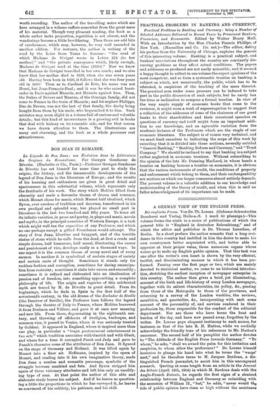DON JUAN IN ROMANCE.
La Legende de Don Juan : son Rvolution dans la Litterature des Origines du Romantisme. Par Georges Gendarme de Bevotte. (Hachette et Cie., Paris.)—Professor Georges Gendarme de Bevotte has set himself for some time past to study the origins, the history, and the innumerable developments of the legend of Don Juan in the literature of Europe; and the results of his learning and enthusiasm are given in great detail and spaciousness in this substantial volume, which represents only the firstfruits of his work. The story which Moliere lifted from obscurity and made a favourite theme of drama and romance, which Mozart chose for music, which Musset half idealised, which Byron, ever careless of tradition and decorum, transformed in his own prodigal and splendid way, has played no small part in literature in the last two hundred and fifty years. To trace all its infinite varieties, in prose and poetry, in plays and music, novels and myths,in the principal countries of Western Europe, is a task which might well tax the capacities of any Professor, and which no one perhaps except a gifted Frenchman would attempt. The story of Don Juan, libertine and braggart, and of the terrible statue of stone which he calls from the dead, at first a crude and simple drama, half humorous, half moral, illustrating the career and punishment of vice, develops easily in a thousand ways. In one aspect it is the common theme of every novel and of every sermon. In another it is symbolical of certain stages of society and certain casts of thought. Sometimes it stands only for reckless fashion and corruption, sometimes for daring emancipa- tion from restraint; sometimes it sinks into excess and sensuality ; sometimes it is refined and elaborated into an idealisation of passion and of freedom, into something approaching a complete philosophy of life. The origin and vagaries of this celebrated myth are traced by M. de Berate in great detail. From its beginnings, which he finds in Spain in the first half of the seventeenth century, in the old drama of the Burlador de Seville (the Deceiver of Seville), the Professor here follows the legend through the theatre of Italy to France, where Moliere borrowed it from Dorimon and Villiers, and gave it at once new meaning and new life. From there, degenerating in the eighteenth cen- tury, and throwing off offshoots of irreligion, burlesque, and common vice, it passed to Venice, where it was seriously treated by Goldoni. It appeared in England, where it inspired more than one play, in particular a "tragic pantomintical entertainment in two acts" which tradition associates with Garrick and with Gluck, and where for a time it corrupted Punch and Judy and gave to Punch's character some of the attributes of Don Juan. It figured on the stage of Germany and Holland. It was lifted again by Mozart into a finer air. Hoffmann, inspired by the opera of Mozart, and reading into it his own imaginative theory, made Don Juan a sombre and romantic personage, symbolic of the struggle between mankind and fate. And Byron stripped him again of these visionary attributes and left him only an unedify- ing type of man. At that point the author of this able and elaborate study leaves his subject. And if he leaves us question- ing a little the proportions in which he has surveyed it, he leaves us convinced of his subtlety, his patience, and his skill-






























































 Previous page
Previous page